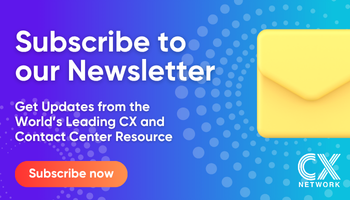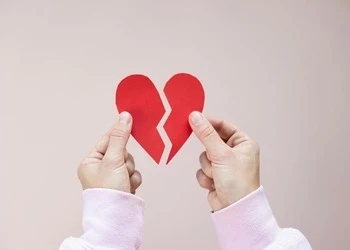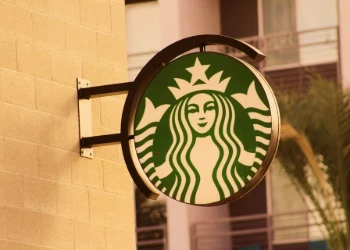Why customer intimacy is the future of CX
The “King of CX” unpacks the psychology behind brand intimacy
Add bookmark
At this year’s X4 Summit in Salt Lake City, CX Network sat down with one of the most insightful voices in customer experience (CX) - Ken Hughes, widely recognized as the "King of CX." With his background in consumer behavior and brand relationships, Hughes brought a unique perspective to the emotional undercurrents driving modern CX.
In this interview, Hughes unpacked the psychology behind brand affinity, emotional engagement and the power of investing in genuine connections.

Don't miss any news, updates or insider tips from CX Network by getting them delivered to your inbox. Sign up to our newsletter and join our community of experts.
CX Network: Tell us about yourself and what it is you do.
Ken Hughes: I’ve always been fascinated by human behavior - I'm a social scientist at heart. What drives our decisions, how we prioritize - it’s all fascinating. I spent about 15 years in a research agency, diving into customer-brand relationships, and it was clear: brands were product-focused, while customers wanted more. They were saying one thing, brands another. That gap led me into CX, especially through NPS [net promoter score] and consultancy work.
I became deeply interested in what happens when someone buys a product - when they invite a brand into their life. That’s a powerful moment. Whether it’s a car or a coffee, it’s an invitation. And it’s the brand’s job to honor that invitation by delivering a meaningful experience. I often draw parallels with human relationships - dating, love, friendships. Brands should behave the same way. We go all in at the start of a relationship, and then, 10 years later, we’re coasting or even resentful. Brands do that too. They front-load effort, and then treat the customer journey as a finish line. It’s not.
What’s missing is the emotional investment. Brands talk about customer lifetime value (CLV) as a number - how much money a customer will generate. But what about delivering value to the customer over a lifetime? That’s a relationship, not a transaction. And it should be based on what I call DTI - Desire to Invest - not just ROI. In real relationships, we don’t keep score. We invest because we care. It’s the same with CX.
CX Network: Can you share the key ingredients that help brands create those kinds of emotional connections?
Ken Hughes: We’ve moved far beyond just mind space - being top-of-mind through advertising. Now, it’s all about heart space. Brands must ask themselves, “How do our customers feel about us?” Because here’s the truth: brands don’t really exist. The product exists, the logo exists - but the brand is a feeling. It only comes alive when emotional energy is added - like Frankenstein’s monster brought to life by electricity.
That emotional electricity is what creates loyalty. Think Harley-Davidson - riders have an emotional bond, a sense of community. That’s not accidental. It’s built over time. Even in B2B, brands say, “That doesn’t apply to us.” But it does. Smaller markets make intimacy easier to foster.
Customer intimacy is at the core of this. We want customers to feel like they’d be cheating on us by going elsewhere. That’s the goal. Unfortunately, many confuse loyalty with convenience or transactional rewards. “Buy nine coffees, get the tenth free” - that’s not loyalty. It’s bribery. True loyalty is emotional.
Which brings us back to purpose. Today’s consumers - especially Millennials and Gen Z - ask, “Why should I buy from you?” Quality and price are table stakes now. What matters is what you stand for, how you make them feel, and what kind of story you tell. That emotional connection has to be felt across every brand touchpoint - physical, digital, in-store, online.
CX Network: That idea of emotional resonance across all channels reminds me of how you talked about Taylor Swift. She seems to have mastered that customer intimacy. Why do you think she’s been so successful where others haven’t?
Ken Hughes: Taylor Swift is the perfect case study in customer intimacy. From the beginning, she invested just as much in her fans as in her music. She knew the product – the music - wasn’t enough. It’s the fan connection that makes it magic. That’s why she uses two hands as a symbol - it takes both artist and fan to complete the circle.
Even as a teenager in country music, she rejected the traditional model. She wrote her own songs, telling stories her generation cared about. She saw a blue ocean of opportunity. She used MySpace to let fans choose her singles - unheard of in 2006. She let them behind the curtain. That sense of being seen and included created intimacy.
She’s stayed consistent with those values - authenticity, vulnerability, intimacy. Whether it’s surprise parties, fan gifts, or quiet acts of philanthropy, she makes fans feel like they matter. She doesn’t do it for the headlines; she does it because it feels right. That emotional connection has made her multi-generational. Parents now bring their kids to her concerts. She’s never stopped focusing on them - and in doing so, she’s built a brand around them.
Very few artists, or brands, can set aside ego for that long. Most drift from their early values. But she’s never lost sight of the customer. That’s why she’s not just a star - she’s a CX phenomenon.
CX Network: What’s the one message you hope brand leaders take away from your work?
Ken Hughes: That CX isn’t about metrics - it’s about moments. It’s not about the KPIs or quarterly returns – it’s about the relationship. If you want loyalty, if you want lifetime value, then you have to invest emotionally.
Build intimacy. Be authentic. Be vulnerable. Honor the invitation your customer gave you. Because they’ve let you into their lives - and that’s a privilege, not a right.
CX Network: Do you have any suggestions for how brands should approach different CX strategies for different generations? Or should someone from Gen Z be treated the same as someone from a previous generation?
Ken Hughes: It really depends on the category, but I think the winners in CX are the ones who recognize that we’re dealing with multiple active consumer generations today. A Gen Z customer is going to have fundamentally different expectations and habits compared to a Boomer. You have to make decisions even around things like customer touchpoints, the language you use, or your communication channels. For example, a young Gen Z consumer in Australia might want to send a text, while an older customer might prefer a phone call.
That alone changes how you design your service models - and artificial intelligence (AI) plays a role in that too. So it’s important to understand your core demographic and build your CX strategy around that. But it’s equally important to design your CX for the future generations coming in.
And then there’s the emotional intimacy we touched on earlier, even from an employee experience perspective. Think of a university student today applying for their first job - they have completely different expectations. It’s always evolving.
And not only between generations, but even within them. Every five years you see shifts. If you’re a parent with kids who are 5, 10, and 15, you’ll notice differences in each. The values, the way they use technology - it’s all changing quickly.
The next five years are going to radically transform how we connect as a society. From a CX standpoint, that’s incredibly exciting. Think about the tech advancements already happening - it’s moving so fast that in three years, we’ll have tools we can’t even imagine yet. All of this changes how we connect with our customers.
To me, connection is everything - whether it’s in your personal life or as a brand. When a brand can connect with people in a way that feels genuine, authentic, and emotionally meaningful - that’s when you win loyalty. At that point, pricing or product features become secondary. That’s the foundation of the relationship.
CX isn’t about just metrics or NPS scores. Those help, sure, but the real KPI is: Does this customer feel emotionally connected to the brand in a meaningful way? If yes, then you’ve got them.
CX Network: Are there any standout brands for you right now that are really leading in CX innovation?
Ken Hughes: Octopus Energy is a great example I often talk about. It’s a simple idea, but powerful. They looked at the frustration customers feel while waiting on hold - three, four, five minutes on the phone - and thought, how can we make that time feel better, even if we can’t reduce it immediately?
They found a study that said the most nostalgic song for most people is the one from the summer they were 14 - sneaking cigarettes behind the bike sheds and all that. So they built a system, you could call it AI or just smart tech, that uses your phone number and date of birth to play that nostalgic song while you’re on hold. It’s simple, but brilliant. It personalizes the experience and puts the caller in a good mood.
And think about what they’re selling - it’s energy. A commodity. No one cares about it until the power goes out. But they’ve built a strong brand by putting CX at the core. Otherwise, they'd be competing solely on price. Their customers feel that experience. That’s why they’re retaining loyalty at such a high rate.
In industries like finance or insurance where the customer relationship is often passive or even negative, there’s so much room for CX innovation. These newer brands are stepping into that space with fresh thinking. In the end, connection is everything.
CX Network: What’s one question every CEO should ask themselves daily about their customers?
Ken Hughes: Every CEO should ask: What story did we create yesterday that someone told today about our brand?
What moment did we design in the customer journey that brought a smile to someone’s face or made them feel something - enough that they told someone else about it? Unless you’re creating those moments - what I call “shareable experience equity” - your brand barely exists in the customer’s mind.
You want experiences that make people reach into their pocket to take a photo, something worth sharing. That’s what matters - those stories get passed around in offices, on social media, in group chats.
CX Network: Apart from AI, what do you think is the single biggest change coming to CX in the next five to 10 years?
Ken Hughes: Honestly? The rise in emotional intelligence of the next generation of professionals. I think the graduates coming out of university today are the most emotionally intelligent group we’ve ever had. When I was their age, I didn’t even know what emotional intelligence was. But they do. They’re empathetic, more aware, and more driven to make an impact.
They’re not just here to climb the corporate ladder - they want to bring joy, create connection, and make work meaningful. And that’s a game-changer for CX. We’ll start hiring less based on IQ or traditional business backgrounds and more from fields like anthropology, sociology - people who understand human connection.
That shift - toward more emotionally intelligent leadership - is what I think will truly reshape CX in the coming decade.
Quick links:
- Get CX tips: Turning omnichannel insight into innovation
- Customer loyalty: Get tips on leveraging mobile apps
- How Qualtrics’ Isabelle Zdatny envisions the future of CX
CCW UK Summit 2025

CCW UK will provide attendees with insights to break down organisational silos, align cross-functional goals, and integrate human-centric and AI-driven strategies seamlessly.
To view this content, please fill out the form to register and become a member.
Or, if you're already a member, sign in below to view.
Please note: That all fields marked with an asterisk (*) are required.













